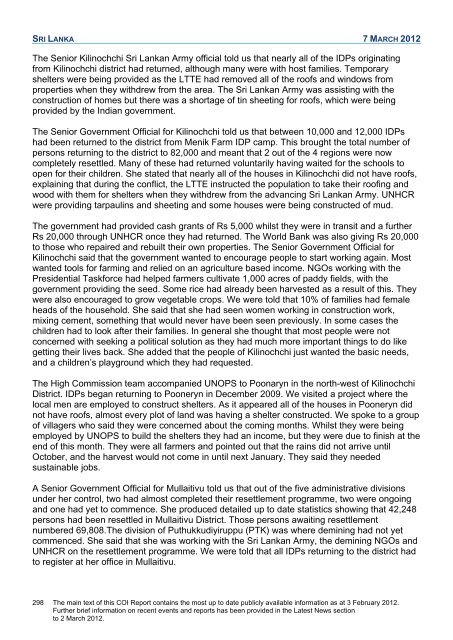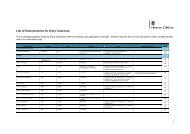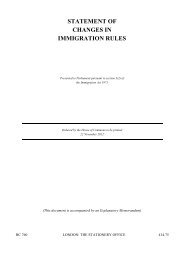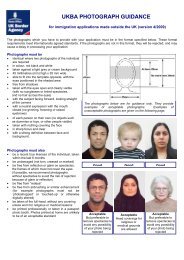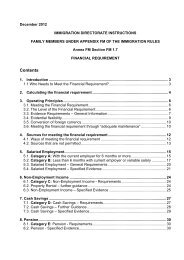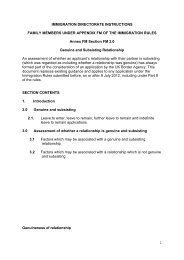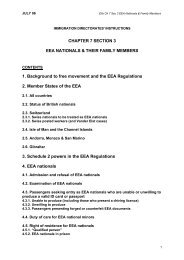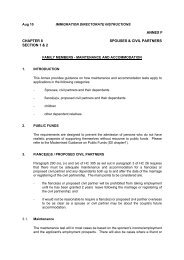COI Report March 2012 - UK Border Agency - Home Office
COI Report March 2012 - UK Border Agency - Home Office
COI Report March 2012 - UK Border Agency - Home Office
Create successful ePaper yourself
Turn your PDF publications into a flip-book with our unique Google optimized e-Paper software.
SRI LANKA 7 MARCH <strong>2012</strong><br />
The Senior Kilinochchi Sri Lankan Army official told us that nearly all of the IDPs originating<br />
from Kilinochchi district had returned, although many were with host families. Temporary<br />
shelters were being provided as the LTTE had removed all of the roofs and windows from<br />
properties when they withdrew from the area. The Sri Lankan Army was assisting with the<br />
construction of homes but there was a shortage of tin sheeting for roofs, which were being<br />
provided by the Indian government.<br />
The Senior Government Official for Kilinochchi told us that between 10,000 and 12,000 IDPs<br />
had been returned to the district from Menik Farm IDP camp. This brought the total number of<br />
persons returning to the district to 82,000 and meant that 2 out of the 4 regions were now<br />
completely resettled. Many of these had returned voluntarily having waited for the schools to<br />
open for their children. She stated that nearly all of the houses in Kilinochchi did not have roofs,<br />
explaining that during the conflict, the LTTE instructed the population to take their roofing and<br />
wood with them for shelters when they withdrew from the advancing Sri Lankan Army. UNHCR<br />
were providing tarpaulins and sheeting and some houses were being constructed of mud.<br />
The government had provided cash grants of Rs 5,000 whilst they were in transit and a further<br />
Rs 20,000 through UNHCR once they had returned. The World Bank was also giving Rs 20,000<br />
to those who repaired and rebuilt their own properties. The Senior Government Official for<br />
Kilinochchi said that the government wanted to encourage people to start working again. Most<br />
wanted tools for farming and relied on an agriculture based income. NGOs working with the<br />
Presidential Taskforce had helped farmers cultivate 1,000 acres of paddy fields, with the<br />
government providing the seed. Some rice had already been harvested as a result of this. They<br />
were also encouraged to grow vegetable crops. We were told that 10% of families had female<br />
heads of the household. She said that she had seen women working in construction work,<br />
mixing cement, something that would never have been seen previously. In some cases the<br />
children had to look after their families. In general she thought that most people were not<br />
concerned with seeking a political solution as they had much more important things to do like<br />
getting their lives back. She added that the people of Kilinochchi just wanted the basic needs,<br />
and a children‘s playground which they had requested.<br />
The High Commission team accompanied UNOPS to Poonaryn in the north-west of Kilinochchi<br />
District. IDPs began returning to Pooneryn in December 2009. We visited a project where the<br />
local men are employed to construct shelters. As it appeared all of the houses in Pooneryn did<br />
not have roofs, almost every plot of land was having a shelter constructed. We spoke to a group<br />
of villagers who said they were concerned about the coming months. Whilst they were being<br />
employed by UNOPS to build the shelters they had an income, but they were due to finish at the<br />
end of this month. They were all farmers and pointed out that the rains did not arrive until<br />
October, and the harvest would not come in until next January. They said they needed<br />
sustainable jobs.<br />
A Senior Government Official for Mullaitivu told us that out of the five administrative divisions<br />
under her control, two had almost completed their resettlement programme, two were ongoing<br />
and one had yet to commence. She produced detailed up to date statistics showing that 42,248<br />
persons had been resettled in Mullaitivu District. Those persons awaiting resettlement<br />
numbered 69,808.The division of Puthukkudiyiruppu (PTK) was where demining had not yet<br />
commenced. She said that she was working with the Sri Lankan Army, the demining NGOs and<br />
UNHCR on the resettlement programme. We were told that all IDPs returning to the district had<br />
to register at her office in Mullaitivu.<br />
298 The main text of this <strong>COI</strong> <strong>Report</strong> contains the most up to date publicly available information as at 3 February <strong>2012</strong>.<br />
Further brief information on recent events and reports has been provided in the Latest News section<br />
to 2 <strong>March</strong> <strong>2012</strong>.


